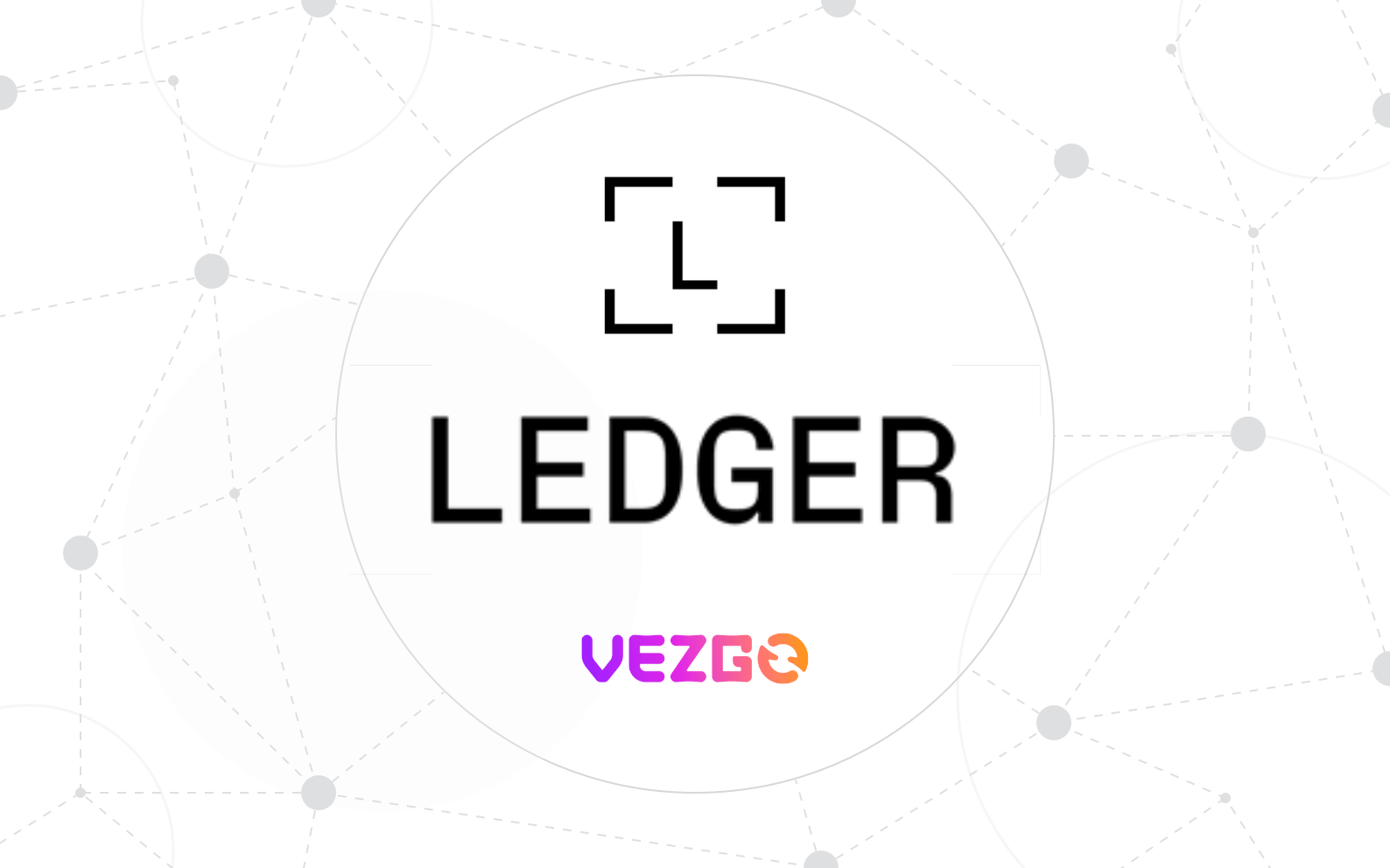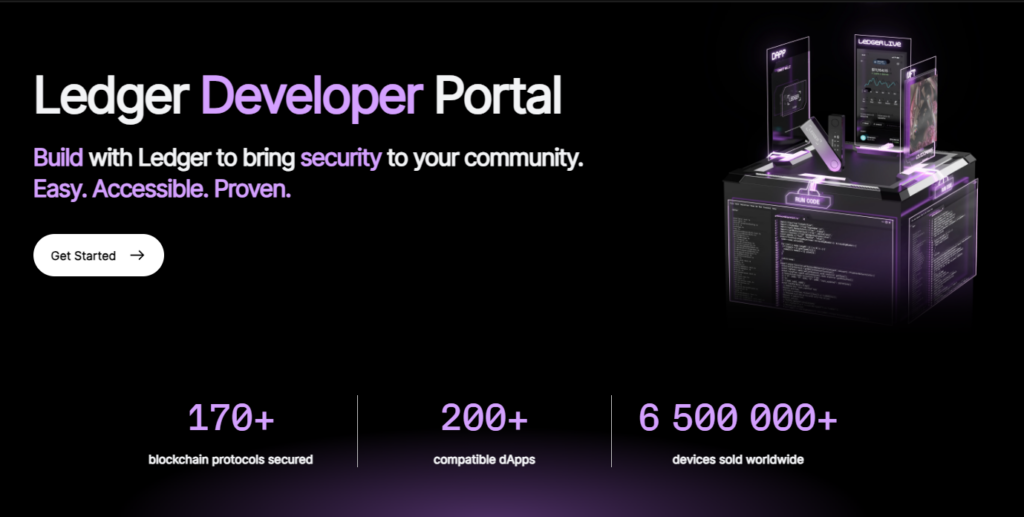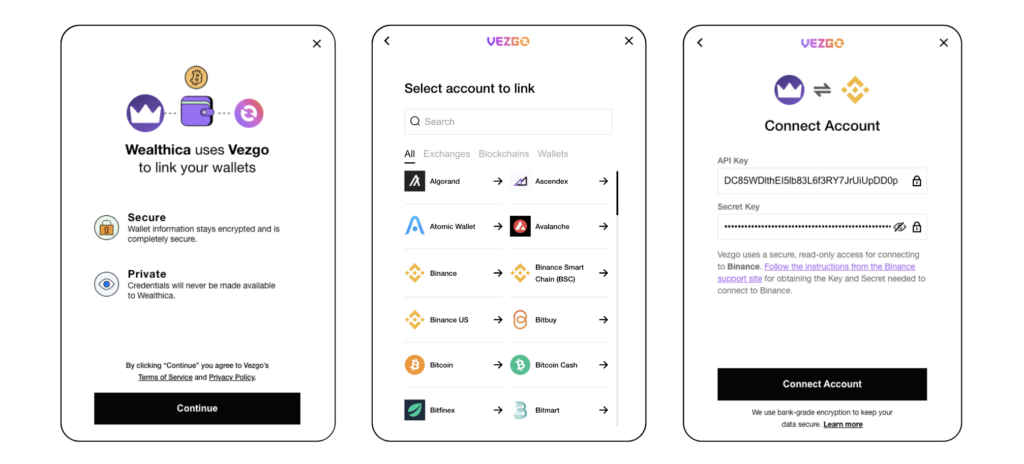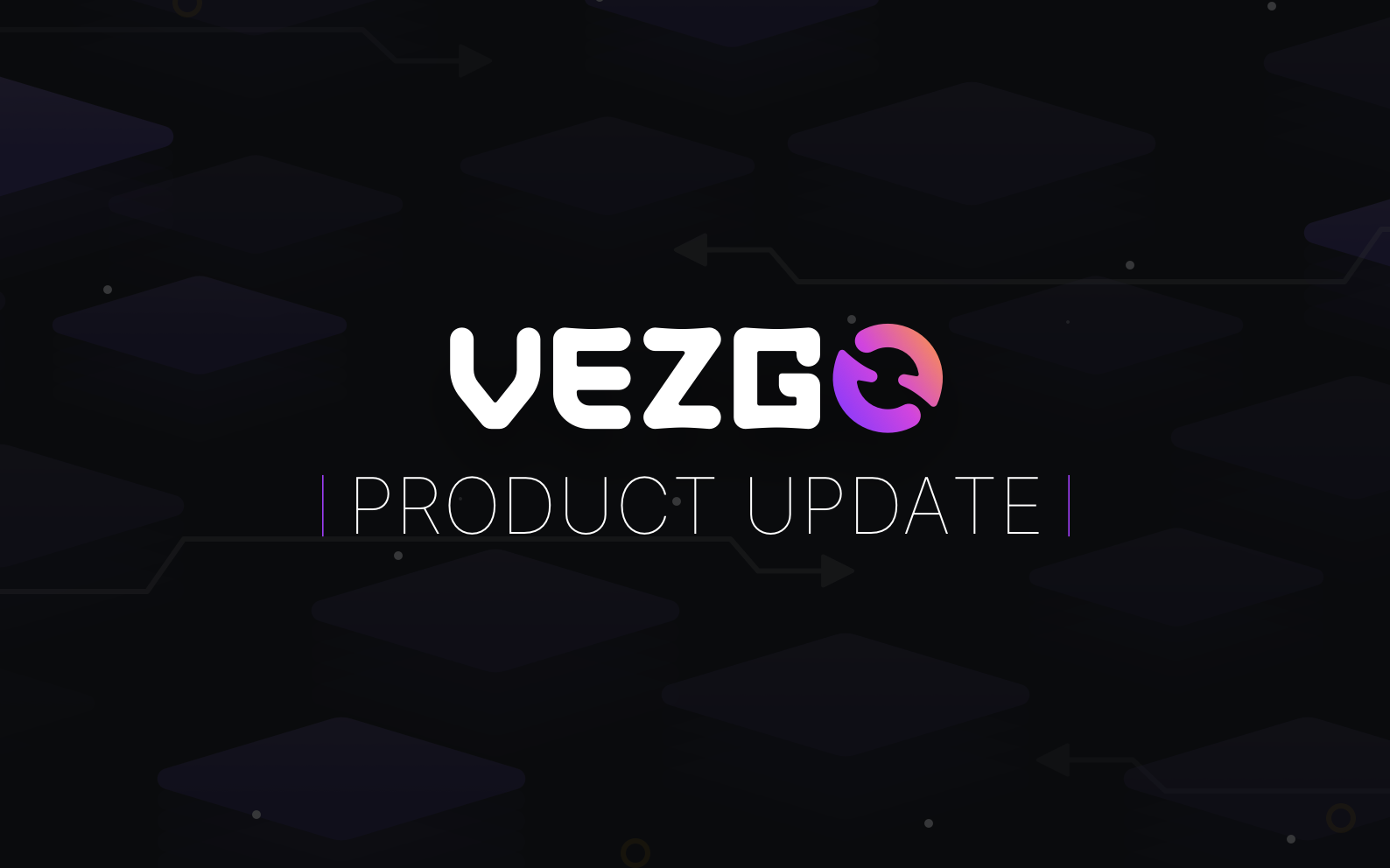
In the rapidly evolving world of cryptocurrency, integrating secure and efficient APIs is crucial for developers aiming to build robust digital asset management platforms. The Ledger API offers powerful tools for secure key management and transaction signing, ensuring that users’ private keys remain safe in an offline environment. However, regarding comprehensive wallet API integration, Vezgo stands out as a versatile alternative that provides an all-in-one solution for crypto portfolio tracking.
This piece delves into the strengths of the Ledger API and explores why developers should consider Vezgo as the best alternative for wallet API integration. We’ll discuss how Vezgo’s seamless connectivity, multi-currency support, and extensive wallet integration capabilities offer a more flexible and user-friendly experience for developers and users alike.
Key Features of the Ledger API

Ledger, a pioneer in hardware wallet technology, offers an API that allows developers to harness the power of its secure infrastructure. The Ledger API ensures that private keys remain in a secure, offline environment, providing peace of mind and complete control over assets. Let’s delve into the key features that make the Ledger API a robust solution for managing digital assets.
1. Secure Key Management
Ledger API’s secure key management is the backbone of its reputation for unparalleled security in the crypto world. By harnessing the power of hardware security modules (HSMs) within Ledger devices, the API ensures that private keys never leave the device’s secure element, safeguarding them from online threats and unauthorized access. This process isolates keys from the internet, meaning even the most sophisticated cyberattacks can’t touch them. Whether generating new keys, signing transactions, or storing sensitive data, the Ledger API keeps everything locked down in a secure, offline environment. This gives developers the confidence to build applications, knowing that their users’ assets remain protected by one of the most trusted names in the industry.
2. Transaction Signing
Ledger API’s transaction signing feature offers a robust layer of security that ensures every transaction gets authorized in the most secure way possible. When a user initiates a transaction, the API prompts the Ledger device to sign it directly within its secure environment, keeping the private key away from potential online threats. This method ensures that the private key never leaves the hardware wallet, making it virtually impossible for hackers to intercept or manipulate it. Whether you’re processing a simple transfer or a complex smart contract, Ledger API’s transaction signing guarantees that each operation remains tamper-proof, providing peace of mind for developers and users alike.
3. Integration With Ledger Live
Ledger API’s integration with Ledger Live creates a seamless and powerful synergy between cutting-edge security and a highly intuitive user experience. Think of Ledger Live as the control center of a state-of-the-art vault, where the Ledger API operates behind the scenes, managing all the critical security functions. This integration empowers developers to give users real-time access to their crypto portfolios, complete with up-to-the-minute balances, detailed transaction histories, and comprehensive performance insights. The API ensures that every interaction—whether checking a balance or initiating a transaction—happens with the highest level of security, with private keys securely stored within the Ledger device’s protected environment. Meanwhile, Ledger Live offers a polished and user-friendly interface, making it easy for users to navigate their assets confidently. This collaboration between the Ledger API and Ledger Live enhances security and enriches the user experience, allowing developers to build applications that deliver both peace of mind and unparalleled convenience.
4. Customizable User Permissions
Ledger API’s customizable user permissions offer developers the flexibility to precisely tailor access controls, ensuring that only the right people have the right level of access. Imagine it as having a set of master keys, where each key is designed to unlock only specific doors. With this feature, developers can define who can view balances, initiate transactions, and access sensitive data within a secure and controlled environment. Whether you’re building a multi-user platform or managing an enterprise-level solution, these granular permissions allow you to maintain strict security protocols while providing the necessary access to those who need it. This level of customization enhances security and streamlines operations, making it easier to manage complex workflows without compromising safety.
5. Scalability
Ledger API’s scalability ensures that as your platform grows, it can handle increased demand without compromising performance or security. Whether managing a small crypto application or a large-scale enterprise solution, the API is designed to expand seamlessly alongside your needs. It supports many transactions and user interactions, allowing developers to build robust, future-proof applications. With its ability to scale efficiently, Ledger API provides the flexibility to accommodate spikes in usage, ensuring a smooth and consistent user experience. This adaptability makes Ledger API a reliable choice for projects of any size, offering the stability and performance required to grow your platform confidently.
6. Developer-friendly Documentation
Ledger API’s developer-friendly documentation is a comprehensive and meticulously organized resource that empowers developers to integrate Ledger’s secure features into their applications seamlessly. It offers detailed explanations, practical code examples, and clear, step-by-step instructions that guide users through everything from initial setup to advanced functionalities. The documentation anticipates potential challenges and provides troubleshooting tips, ensuring developers can quickly overcome hurdles. This thorough and intuitive approach reduces the learning curve, allowing developers to focus on creating innovative and secure applications without being hindered by technical complexities. With Ledger’s documentation, developers gain the confidence to leverage the API’s capabilities fully, bringing their projects to life efficiently and precisely.
7. Open Source Community
Ledger API’s open-source community contributions have become a cornerstone of its innovation and development. The API’s source code is accessible to developers worldwide, encouraging collaboration and collective problem-solving. This open-source approach fosters a vibrant community where developers actively contribute to enhancing the API, whether by fixing bugs, adding new features, or improving documentation. These contributions not only accelerate the API’s evolution but also ensure that it remains responsive to the needs of its users. By embracing open-source principles, Ledger empowers developers to shape the future of secure crypto solutions, creating a dynamic and evolving platform that benefits from the expertise and creativity of a global community.
This list of features is updated frequently. Please refer to the Ledger API documentation page for the most current information on Ledger’s key features.
Why Integrate With Vezgo Instead of Ledger
Opting for Vezgo API over Ledger API offers several notable advantages for integrating crypto functionalities into your application.
- One of the standout features is Vezgo’s Connect Flow. This intuitive UI lets you connect your users’ crypto exchange accounts with just a few clicks. Unlike Ledger’s more hardware-focused approach, Vezgo simplifies the integration process, making it straightforward and user-friendly. This seamless connection process reduces development time and effort, letting you focus more on enhancing your application than managing complex integration tasks.
- Another compelling reason to opt for Vezgo is its comprehensive aggregation of users’ crypto account balances. Vezgo’s API consolidates balance information from various sources, including multiple centralized exchanges, blockchains, and wallets. This all-in-one approach eliminates the need for users to manually track their holdings across various platforms, providing a unified view of their entire crypto portfolio. In contrast, Ledger API primarily focuses on secure key management and transaction signing, which does not offer the same level of balance aggregation and visibility across diverse platforms.
- Vezgo also simplifies retrieving users’ wallet transaction history. The API provides a comprehensive solution for aggregating transaction data from various exchanges and wallets, ensuring you can effortlessly access detailed transaction records. This capability is precious for users who need to monitor their activities across multiple accounts without the hassle of accessing each platform individually. While strong in security, Ledger API does not offer the same ease of accessing and aggregating detailed transaction histories.
These features make Vezgo a more integrated and user-centric solution compared to Ledger API. These capabilities enable developers to deliver a more cohesive and efficient experience managing and tracking crypto assets.
Vezgo The Crypto API

Vezgo’s secure crypto API is the ultimate solution for developers seeking a powerful, easy-to-integrate tool for managing digital assets. With just one API, Vezgo simplifies the complex process of accessing and aggregating users’ cryptocurrency balances, tokens, and transaction histories across various exchanges, wallets, and blockchains. It supports centralized and decentralized crypto data with consistent formatting and timely updates. This streamlined approach allows developers to enhance their products with comprehensive crypto data integration, making providing users with a seamless and informative experience easier.
For those looking to incorporate non-fungible token (NFT) data into their products, Vezgo offers a robust solution. The API provides real-time access to NFT data across multiple blockchains, enabling developers to track NFT ownership, transfers, and price trends effortlessly. Whether you’re building a marketplace, a portfolio tracker, or an analytics tool, Vezgo’s NFT metadata retrieval feature ensures that your users have up-to-date and accurate information at their fingertips.
Vezgo also excels in delivering real-time transaction notifications, keeping you and your users informed of every new development. By integrating with major centralized exchanges (CEXes), Vezgo’s API allows you to receive instant transaction updates via webhooks whenever a new transaction occurs. This real-time data keeps your application in sync with your users’ assets and transactions, ensuring they always have the latest information on their crypto accounts. With Vezgo, you can elevate your product by offering secure, timely, and comprehensive crypto data integration.
Vezgo’s Ledger Integration

Vezgo’s API empowers developers to efficiently manage multiple exchange APIs and wallets by integrating various platform features into one cohesive solution.
Instead of dealing with the complexity of handling various APIs separately, Vezgo offers a unified gateway that brings together the functionalities of these diverse platforms into a single, seamless interface. This integration not only simplifies the development process but also enhances your application’s overall efficiency and reliability, making Vezgo an indispensable tool for streamlining complex integrations.
You can refer to the detailed list and select Ledger for specific insights and additional information to gain a deeper understanding of how Vezgo collaborates with the Ledger API and explore its full range of capabilities.
About Ledger

Ledger is a leading name in the cryptocurrency world, renowned for its cutting-edge hardware wallets that prioritize security and user control. Founded in 2014, Ledger quickly became a trusted partner for millions of crypto enthusiasts and investors around the globe. By storing private keys offline, Ledger’s devices provide unparalleled protection against online threats, giving users peace of mind that their digital assets remain safe from hackers. Whether you’re a seasoned crypto investor or just starting, Ledger’s products offer a secure and user-friendly way to manage and protect your digital wealth.
Beyond its hardware wallets, Ledger has expanded its offerings with the Ledger Live app and API, creating a comprehensive ecosystem for crypto management. Ledger Live allows users to manage their crypto assets, view balances, and execute transactions from a single interface. At the same time, the Ledger API opens up new possibilities for developers looking to integrate secure crypto functionalities into their applications. By combining robust security with ease of use, Ledger continues to make cryptocurrency accessible, secure, and manageable for everyone.





Leave a Reply